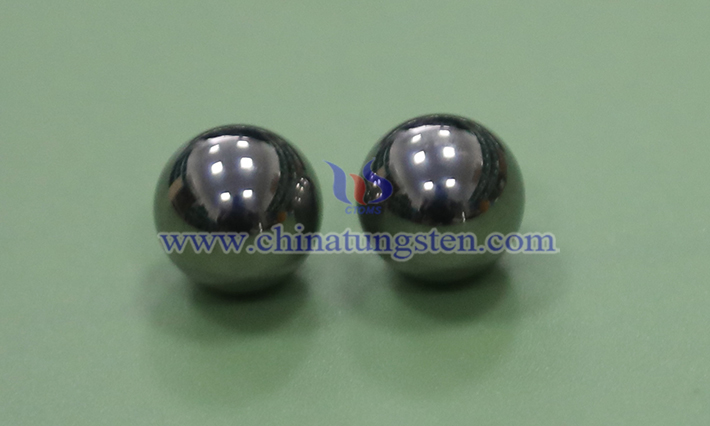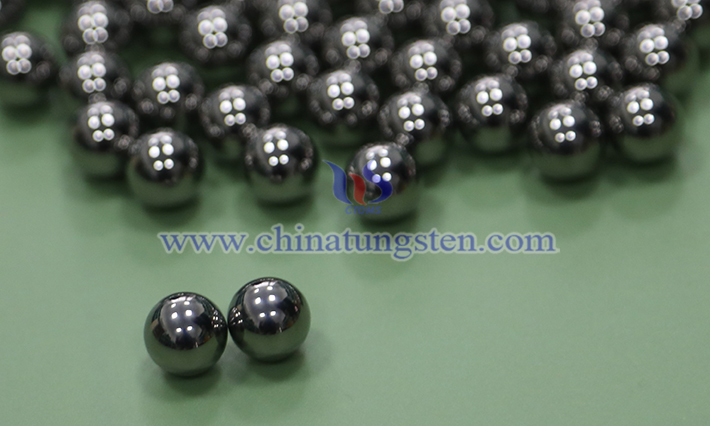Chemical Stability of Tungsten Cemented Carbide Balls
- Details
- Category: Tungsten Information
- Published on Friday, 12 September 2025 17:14
The excellent chemical stability of tungsten cemented carbide balls stems primarily from their unique material composition and powder metallurgy process, as demonstrated below:

1. The Material Basis for the Chemical Stability of Tungsten Cemented Carbide Balls
Tungsten cemented carbide balls are based on high-hardness, refractory metal carbides (such as tungsten carbide (WC) and titanium carbide (TiC). These carbides are inherently extremely chemically inert and, at room temperature, do not react with common acids and bases such as water, hydrochloric acid, and sulfuric acid. They only slowly dissolve in high-temperature, strongly oxidizing environments (such as aqua regia or a nitric-hydrofluoric acid mixture).
2. The Role and Stability of Binders
Metal binders such as cobalt (Co) and nickel (Ni) are used in the powder metallurgy process to tightly bind the carbide particles together, forming a dense structure. Although cobalt may oxidize at high temperatures, tungsten cemented carbide balls are typically sintered in a vacuum or hydrogen reduction furnace to effectively avoid oxidation. In addition, the binder dosage is precisely controlled (for example, the cobalt content in grades like YG6 and YG8 is 6%-8%), ensuring strength without significantly compromising overall chemical stability.

3. Specific Corrosion Resistance
Acid and Alkali Corrosion Resistance: In corrosive environments such as petrochemicals and hydrochloric acid laboratories, tungsten cemented carbide balls can operate stably and for a long time without significant surface corrosion or performance degradation.
Oxidation Resistance: Even under high-temperature conditions, tungsten cemented carbide balls maintain high hardness and are not easily reactive with oxygen, making them suitable for applications such as high-temperature bearings and valve motors.
Solvent Resistance: In applications involving organic solvents, such as sprayers and water pumps, tungsten cemented carbide balls will not swell or soften due to solvent penetration, ensuring dimensional accuracy and wear resistance.
4. Chemical Stability Supports Tungsten Cemented Carbide Balls Performance
Chemical stability directly enhances the durability and reliability of tungsten cemented carbide balls:
Extended Service Life: In high-precision applications such as precision bearings and instrumentation, chemical stability ensures long-term dimensional stability of the balls, reducing wear or seizure caused by corrosion. Adaptable to Harsh Environments: In extreme operating conditions such as oilfield equipment and hardness testers, tungsten cemented carbide balls can replace traditional steel balls, withstanding the combined effects of high pressure, high temperature, and corrosive media.
Reduced Maintenance Costs: Due to their corrosion resistance, tungsten cemented carbide balls require less frequent replacement during long-term use, significantly reducing equipment downtime and maintenance costs.
5. Typical Applications of Tungsten Cemented Carbide Balls
Petrochemical: Components such as valve balls and sealing valves are exposed to corrosive media for extended periods. Tungsten cemented carbide balls ensure sealing performance through their chemical stability.
Aerospace: High-precision equipment such as inertial navigation systems and ball screws requires balls that remain stable under extreme temperatures. Tungsten cemented carbide balls meet this requirement.
Medical Devices: In applications such as hydrochloric acid laboratories, tungsten cemented carbide balls are used in hardness testers, where their chemical stability ensures accurate measurement results.
- Chinatungsten Online: tungsten-carbide.com.cn
- CTIA GROUP LTD: en.ctia.group
- Tungsten News & Price: www.ctia.com.cn
- Molybdenum News & Price: news.molybdenum.com.cn
- Tel.: 86 592 5129696; Email: sales@chinatungsten.com



 sales@chinatungsten.com
sales@chinatungsten.com